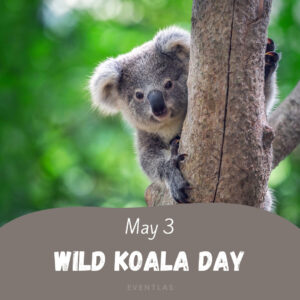May 03rd is Wild Koala Day, a day to celebrate wild koalas and protect their habitats!
Koalas, marsupials native to Australia, are known for their distinctive appearance, which includes thick fur, large round ears, and a flat face. Koalas are herbivores, and their diet consists primarily of eucalyptus leaves, which they are able to digest thanks to a special bacteria in their stomachs.

Koalas are generally solitary animals and spend most of their time sleeping in trees, where they are well camouflaged due to their fur coloration. They are also known for their vocalizations, including grunts, snores, and bellows.
The Koala is currently listed as a vulnerable species on The International Union for Conversation of Nature’s Red List of Threatened Species along with 5,195 other animals.
The IUCN Red List is a critical indicator of the health of the world’s biodiversity. Far more than just a list of species and their status, it is a powerful tool to inform and catalyze action for biodiversity conservation and policy change, critical to protecting the natural resources we need to survive. It provides information about the range, population size, habitat and ecology, use and/or trade, threats, and conservation actions that will help inform necessary conservation decisions.
There are a number of threats to the Koala’s survival but the primary threats include:
Habitat loss: Koalas require large areas of intact eucalyptus forests to survive, but much of their habitat has been destroyed or fragmented by land clearing, urbanization, and other human activities.
Climate change: Climate change is having a significant impact on koala habitat, as rising temperatures and changing rainfall patterns can affect the growth and distribution of eucalyptus trees. This can lead to reduced food availability and lower reproductive success for koalas.
Disease: Koalas are susceptible to a number of diseases, including chlamydia, which can lead to infertility and other health problems. Disease outbreaks can spread quickly through koala populations and have a devastating impact.
Bushfires: Koalas are also at risk from bushfires, which can destroy large areas of habitat and kill or injure animals directly. The 2019-2020 Australian bushfires, in particular, had a significant impact on koala populations, with an estimated 30% decline in some areas.
Overall, the combination of these factors is putting significant pressure on koala populations, and urgent action is needed to protect them and their habitats.
As an iconic Australian species, Koalas are an important part of the country’s natural heritage and cultural identity. Losing koalas would represent a significant loss to the world’s biodiversity and natural beauty. They also play an important ecological role as seed dispersers for eucalyptus trees. Eucalyptus trees are a keystone species in Australia, and their survival is important for maintaining the health of the country’s ecosystems. Without koalas, eucalyptus trees may not be able to spread and grow as effectively, which could have negative effects on the entire ecosystem.
In summary, saving koalas is not only important for their own survival but also for the health and vitality of the ecosystem and the cultural identity of Australia.
To find out more about what you can do to help this World Koala Day click the link below:
https://www.wildkoaladay.com.au/
Bronwyn Reid | May 2023
